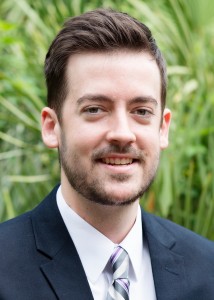Every year, thousands of young adults throughout Florida drop out of college before completing their degrees. A team of researchers at the University of Florida’s College of Education wants to find out whether a “nudge” will help these former students return to college.
Led by Justin Ortagus, assistant professor of higher education administration, the scholars this month launched a two-year study to determine whether ex-students at five Florida colleges who receive targeted emails and financial incentives are more likely to re-enroll and finish their two- or four-year degrees.
“Throughout Florida, thousands of previously successful students have stopped enrolling in college for whatever reason,” Ortagus said. “We’re trying to nudge these students to re-enroll and ultimately reap the benefits associated with completing their degree.”

Justin Ortagus
Ortagus’ project was recently supported by a $300,000 grant from the Helios Education Foundation, a nonprofit organization with a mission to help people in Florida and Arizona succeed in postsecondary education. Numerous studies have shown that students who complete a college degree have higher earnings and an improved quality of life when compared with those who don’t.
Braulio Colón, vice president of Florida Student Success Initiatives for Helios, said, “the work of re-engaging students to complete their postsecondary degrees is one that Helios proudly supports. We want to ensure more Floridians gain the skills that make them, and our state, more prosperous and competitive.”
Rising number of students drop out before completing a degree
Ortagus said the study could determine if a relatively low-cost directed email campaign can help address a troubling issue: The rising number of students who drop out and never complete their college degree. To cite one study, less than 40 percent of Americans who enroll in public community colleges complete their degree within six years. In Florida, just 18 percent of full-time community college students complete an associate’s degree within three years, and the rates are much lower for black and Hispanic students than white students.
Ortagus and the UF research team have partnered with five large Florida community colleges — Valencia, Miami Dade, Broward, Palm Beach State and Hillsborough Community — on the study. These institutions were chosen in part because of their diverse student body and high enrollments. Targeted students are those who previously earned more than half of their required credit hours and had a least a 2.0 GPA.
Specifically, students who failed to complete their degrees at participating colleges will be randomly assigned to one of three groups. Some of them will receive re-enrollment and financial aid information before critical deadlines, while others will get the same info and a small financial incentive. The two intervention groups will also receive automated follow-up emails with links to required forms, and information on financial aid and contacts for college personnel. A control group will receive only a single email.
All of the former students will be directed to a customized website to re-enrollment information, and the researchers will track which students opened emails and clicked direct links. A randomized, controlled trial will be conducted to evaluate the effectiveness of the project. Researchers also will survey participating non-completers who re-enrolled to better understand why they stopped taking courses in the first place.
“Behavioral nudges have been proven to be effective and relatively inexpensive ways to improve academic outcomes,” Ortagus said. “These light nudges have led to some non-trivial increases in enrollment and educational attainment at a reduced cost. When you consider the labor and capital required to develop and evaluate this type of initiative, this project makes a lot of sense for colleges seeking to improve their academic outcomes.”
Ortagus is the principal investigator on the project. Other members of the research team are co-principal investigators Isaac McFarlin and Dennis Kramer, both of whom are faculty members in the college’s Higher Education Administration and Policy program.
Sources:
Justin Ortagus, 352-273-4338
Grace Maseda, Helios Education Foundation, 813-387-0221
Writer, media contact:
Charles Boisseau, 352-274-4449, 512-431-2269 (c)




